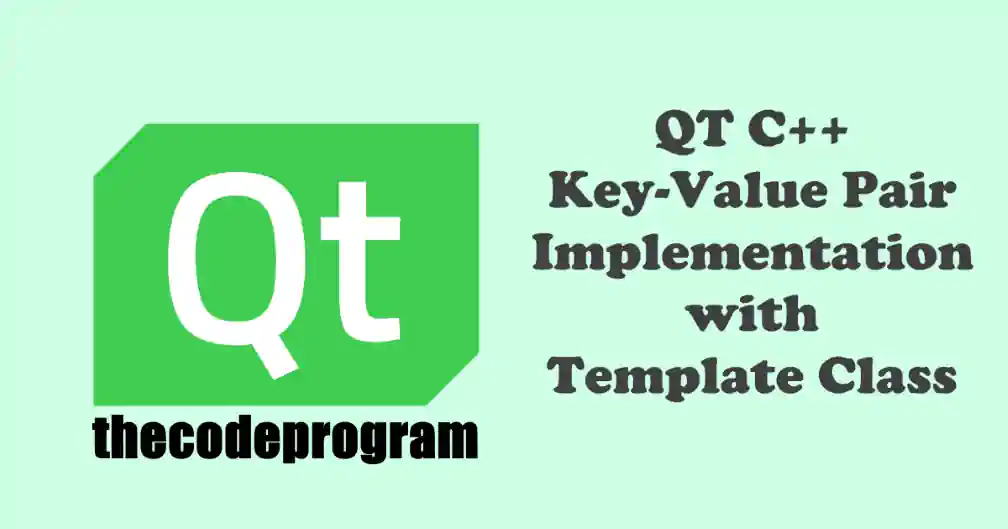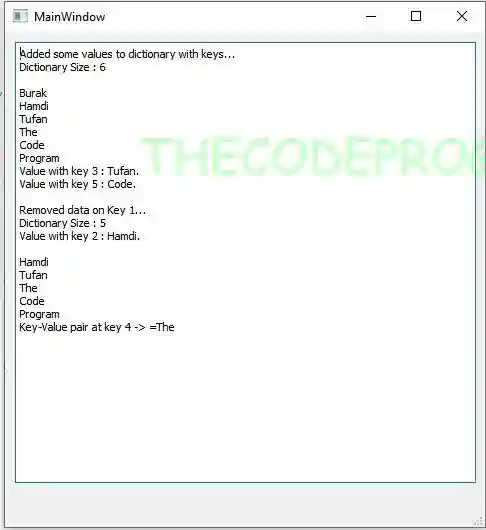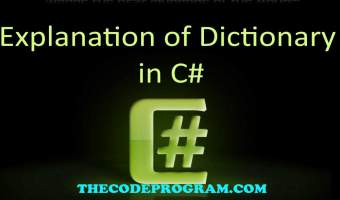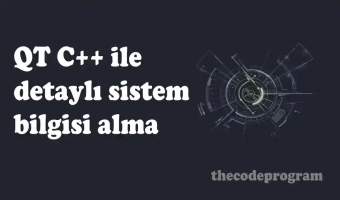
QT C++ Key-Value Pair Implementation with Template Class
Hello everyone, in this article we are going to talk about how can we create our custom key - value pair arrays in Qt C++ and Template programming and QVector.Let's begin.
In here we are going to use Template programming. So if you have no idea of Template programming firstly take a look at below article. https://thecodeprogram.com/explanation-of-template-programing-in-c---and-qt
In C# I used Dictionary class for this purpose very much. So I will use the Dictionary word since here.
Firstly we need to create a Header file and name it What you want. I here named this header file as QDictionary. Here we did not created cpp file because we can not access the private variables directly. One of our articles I will talk about PIMPL design patter to access them in C++.
In this header file we will create a template class and its private and public sections. Then I will implement required methods and variables in this class.
Below you can see our template class property and method structure.
qdictionary.h
#include <QVector>
#include <QString>
#include <QDebug>
template <typename TKey, typename TValue> class QDictionary
{
private:
TKey key;
TValue value;
unsigned int size =0;
QVector<TKey> * arrKeys = new QVector<TKey>(1);
QVector<TValue> * arrValues = new QVector<TValue>(1);
QString controlKeyOutput(TKey k){
std::string t = typeid(TKey).name();
if(t == "int" ) return QString::number(k);
//else if(t == "class QString" ) return k;
else return "";
}
//I have no ideo why it is returning 7QString.
//it was returning class QString at QT 5.8
QString controlValueOutput(TValue v){
std::string t = typeid(TValue).name();
if(QString::fromStdString(t).indexOf("QString") > -1) return v;
else return "";
}
public:
QDictionary();
void add(TKey k, TValue v){
arrKeys->append(k);
arrValues->append(v);
size++;
//prepare for next adding
arrKeys->resize(size+1);
arrKeys->resize(size+1);
}
TValue getWithkey(TKey k){
int index = arrKeys->indexOf(k);
return arrValues->at(index);
}
void removeFromIndex(int i){
arrKeys->remove(i);
arrValues->remove(i);
size--;
//prepare for next adding
arrKeys->resize(size-1);
arrKeys->resize(size-1);
}
void removeFromKey(TKey k){
int index = arrKeys->indexOf(k);
removeFromIndex(index);
}
void removeFromValue(TValue v){
int index = arrValues->indexOf(v);
removeFromIndex(index);
}
int getSize(){ return size; }
QString getPairAtKey(TKey k){
qDebug() << "TValue türü : " << typeid(TValue).name() << Qt::endl;
int index = arrKeys->indexOf(k);
QString rK = controlKeyOutput( arrKeys->at(index) ) ;
QString rV = controlValueOutput( arrValues->at(index) );
return rK + "=" + rV;
}
QString getAllValues(){
QString output = "";
for(unsigned int i=0; i<arrValues->size(); i++){
output += controlValueOutput(arrValues->at(i)) + "\n";
}
return output;
}
};
Let's talk about some of above methods.
add(TKey k, TValue v) method:
void add(TKey k, TValue v){
arrKeys->append(k);
arrValues->append(v);
size++;
//prepare for next adding
arrKeys->resize(size+1);
arrKeys->resize(size+1);
}
we will get data wusing key with getWithkey(TKey k) method.
TValue getWithkey(TKey k){
int index = arrKeys->indexOf(k);
return arrValues->at(index);
}
we will use removeFromIndex(int i) and removeFromKey(TKey k) methods to remove datas from Dictionary.
void removeFromIndex(int i){
arrKeys->remove(i);
arrValues->remove(i);
size--;
//prepare for next adding
arrKeys->resize(size-1);
arrKeys->resize(size-1);
}
void removeFromKey(TKey k){
int index = arrKeys->indexOf(k);
removeFromIndex(index);
}
Also we can get data types of variables with typeid.
QString controlKeyOutput(TKey k){
std::string t = typeid(TKey).name();
if(t == "int" ) return QString::number(k);
//else if(t == "class QString" ) return k;
else return "";
}
QString controlValueOutput(TValue v){
std::string t = typeid(TValue).name();
if(t == "class QString" ) return v;
else return "";
}
Until here out methods are ready. Now, It is time to test our QDictionary.
At my UI class
mainwindow.cpp
QString res = "";
Dictionary<int, QString> *dict = new Dictionary<int, QString>();
dict->add(1,"Burak");
dict->add(2,"Hamdi");
dict->add(3,"Tufan");
dict->add(4,"The");
dict->add(5,"Code");
dict->add(6,"Program");
res += "Added some values to dictionary with keys...\n";
res += "Dictionary Size : " + QString::number( dict->getSize() ) + " \n";
res += dict->getAllValues();
res += QStringLiteral("Value with key 3 : %1. \n").arg( dict->getWithkey(3) ) ;
res += QStringLiteral("Value with key 5 : %1. \n\n").arg( dict->getWithkey(5) ) ;
dict->removeFromKey(1);
res += "Removed data on Key 1...\n";
res += "Dictionary Size : " + QString::number( dict->getSize() ) + " \n";
res += QStringLiteral("Value with key 2 : %1. \n").arg( dict->getWithkey(2) ) ;
res += dict->getAllValues();
res += "Key-Value pair at key 4 -> " + dict->getPairAtKey(4);
ui->plainTextEdit->setPlainText(res);
That is all in this article.
You can reach the source code of example on Github via below link.
https://github.com/thecodeprogram/Dictionary-Impl.-With-Template-in-Qt-C-
Burak Hamdi TUFAN





Comments